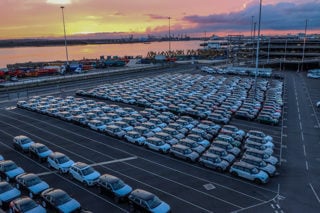The Government has been urged to secure a deal which safeguards the interests of UK automotive and the fleet industry after the country voted to leave the European Union (EU).
The Society of Motor Manufacturers and Traders (SMMT) issued the plea after almost 17.5 million people (51.9%) backed Brexit.
Within hours of the result being officially declared, Prime Minister David Cameron announced he will step-down by October and the London stock market plunged more than 8%. In the opening minutes of trade, the FTSE 100 index fell more than 500 points to 5,808.72. Banks were hit hard, with Barclays and RBS falling about 30%.
Mike Hawes, SMMT chief executive, said: “The British public has chosen a new future out of Europe. Government must now maintain economic stability and secure a deal with the EU which safeguards UK automotive interests. This includes securing tariff-free access to European and other global markets, ensuring we can recruit talent from the EU and the rest of the world and making the UK the most competitive place in Europe for automotive investment."
BVRLA chief executive Gerry Keaney said: “The British public has chosen a future out of the European Union, and like most businesses, the fleet industry will need time to assess the ramifications of the referendum result.
“The BVRLA will continue to assist members in their operations, and we will regularly update members when possible on the implications for our sector regarding the decision to leave the EU.
“The first priority for the Government is to restore economic stability to the UK market.
“For its part, the association will be working closely with UK and European policymakers to ensure that the exit process has a minimal impact on members and their customers. We remain confident that BVRLA members will adapt – after all, our sector is very experienced in dealing with challenge and change.
ACFO chairman John Pryor said: “As an organisation ACFO made no comment in the run-up to the referendum vote and it will not engage in speculation in the wake of the leave decision.”
Rupert Pontin, director of valuations, Glass’s, offered a view on values. He added: "Markets will be affected, as will the value of the pound, and we expect to see consumer confidence tail off until the view of the way forward becomes clearer. How long this will take is difficult to predict. For the motor industry, all of these developments are very likely to have negative effects including a period of instability for new and used car sales, as well as an increase in pre-reg activity and downward pressure on values."
Paul Hollick, managing director of The Miles Consultancy and chair of the Institute of Car Fleet Managers (ICFM), said: "The next 12 months will be an unprecedented period for the fleet and automotive industries, which are strikingly multinational whether you're talking about suppliers, major customers or of course the vehicle manufacturers.
"The leave vote clearly puts UK PLC into uncharted territory. Businesses like nothing less than uncertainty so my worry is that we the prolonged period of political upheaval and economic turmoil ahead will mean that businesses go into suspended animation and inward investment will be postponed or made elsewhere."
Meanwhile, the Freight Transport Association (FTA) says says exit negotiations must ensure the goods keep moving.
It warned that coming out of the EU now risks new costs, restrictions and bureaucratic requirements being imposed on moving goods in and out of Europe. These additional burdens could add costs for FTA members and disrupt the UK's supply chains, it says.
The Government has two years to negotiate the new rules – one example is the need for international road transport customs carnets, last used by the UK in 1992, which are required to allow goods to move under customs control across international borders.
FTA is calling on the Government to prioritise arrangements for international freight transport in its negotiations, minimising additional legislation and keeping costs as low as possible for British businesses.
FTA chief executive David Wells said: “Even though we are coming out of Europe politically, it remains our biggest export market and the supplier of a high proportion of our imports. We cannot allow new bureaucratic burdens to hamper the efficient movement of exports heading for customers and imported goods destined for British consumers."
FTA will be regularly updating its members on progress and pressing the Government to put freight transport at the top of the agenda.
Wells continued: “The Government has two years to ensure the conditions currently imposed on other non-EU member states such as Albania and Serbia are not imposed on UK freight flows. Norway and Switzerland have better arrangements but have accepted tough conditions including the free movement of people, so this will be a difficult negotiation.
"Britain may be out of Europe but it's not out of business and FTA will be leading the campaign on behalf of exporters and importers to keep trade procedures simple and the costs of international transport down.”























Nigel Boyle - 24/06/2016 12:03
The only real thing that will help the UK car industry is when all the UK drivers choose JLR, Nissan, Toyota, Honda, Mini etc as their next car and NOt BMW, Audi, Mercedes.